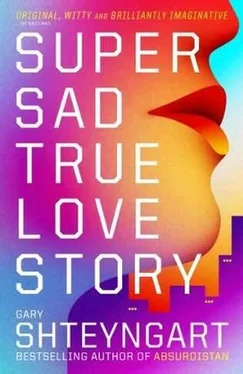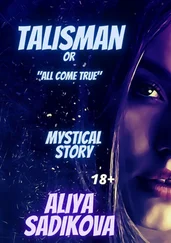Then I celebrated my Wall of Books. I counted the volumes on my twenty-foot-long modernist bookshelf to make sure none had been misplaced or used as kindling by my subtenant. “You’re my sacred ones,” I told the books. “No one but me still cares about you. But I’m going to keep you with me forever. And one day I’ll make you important again.” I thought about that terrible calumny of the new generation: that books smell . And yet, in preparation for the eventual arrival of Eunice Park, I decided to be safe and sprayed some Pine-Sol Wild Flower Blast in the vicinity of my tomes, fanning the atomized juices with my hands in the direction of their spines. Then I celebrated my other possessions, the modular-design furniture and sleek electronica and the mid-1950s Corbusier-inspired dresser stuffed with mementos of past relationships, some pretty racy and scented with nether regions, others doused in the kind of sadness that I should really learn to let go. I celebrated the difficult-to-assemble balcony table (one leg still too short) and had a pretty awful non-Roman coffee al fresco , looking out on the busy downtown skyline some twenty blocks away from me, military and civilian choppers streaming past the overblown spire of the “Freedom” Tower and all that other glittering downtown hoo-hah. I celebrated the low-rise housing projects crowding my immediate view, the so-called Vladeck Houses, which stand in red-brick solidarity with my own co-ops, not exactly proud of themselves, but feeling resigned and necessary, their thousands of residents primed for summer warmth, and, if I may speculate, summer love. Even from a distance of a hundred feet, I can sometimes hear the pained love-cries their residents make behind their tattered Puerto Rican flags, and sometimes their violent screams.
With love in mind, I decided to celebrate the season. For me the transition from May to June is marked by the radical switch from knee to ankle socks. I slapped on white linen pants, a speckled Penguin shirt, and comfy Malaysian sneakers, so that I easily resembled many of the nonagenarians in my building. My co-ops are part of a NORC-a Naturally Occurring Retirement Community-a kind of instant Florida for those too frail or poor to relocate to Boca in time for their deaths. Down by the elevator, surrounded by withered NORCers in motorized wheelchairs and their Jamaican caregivers, I counted the daily carnage of the Death Board by the elevators. Five residents of the NORC had passed in the last two days alone. The woman who had lived above me, eightysomething Naomi Margolis in E-707, was gone, and her son David Margolis was inviting her eclectic neighbors-the young Media and Credit professionals, the old widowed socialist seamstresses, and the ever-multiplying Orthodox Jews-to “celebrate her memory” at his house in Teaneck, New Jersey. I admired Mrs. Margolis for living as long as she did, but once you give in to the idea that a memory is somehow a substitute for a human being, you may as well give up on Indefinite Life Extension. I guess you can say that, while admiring Mrs. Margolis, I also hated Mrs. Margolis. Hated her for giving up on life, for letting the waves come and recede, her withered body in tow. Maybe I hated all the old people in my building, and wished them to disappear already so that I could focus on my own struggle with mortality.
In my trendy old-man’s getup, I ambled with easy grace down Grand Street toward the East River Park, stepping on each curb with the profound “oy” that is the call-and-response of my neighborhood. I sat on my favorite bench, next to the stocky, splay-footed realism of the Williamsburg Bridge’s anchorage, noticing how part of the structure looked like a bunch of stacked milk crates. I celebrated the teenaged mothers from the Vladeck Houses tending to their children’s boo-boos (“A bee touched me, Mommy!”). I relished hearing language actually being spoken by children. Overblown verbs, explosive nouns, beautifully bungled prepositions. Language, not data. How long would it be before these kids retreated into the dense clickety-clack äppärät world of their absorbed mothers and missing fathers?
Then I caught sight of a healthy-looking old Chinese woman ripe for celebration and, at the speed of half a furlong an hour, tailed her down Grand Street and then East Broadway, watching her feel up exotic tubers and slap around some silvery fish. She was shopping with suburban abandon, buying everything that came within her grasp and then, after each purchase, running over to stand next to one of the wooden telegraph poles that now lined the streets.
My fashion friend Sandi in Rome had told me about the Credit Poles, yapping on about their cool retro design, the way the wood was intentionally gnarled in places and how the utility wire was replaced by strings of colored lights. The old-fashioned appearance of the Poles was obviously meant to evoke a sturdier time in our nation’s history, except for the little LED counters at eye level that registered your Credit ranking as you walked by. Atop the Poles, American Restoration Authority signs billowed in several languages. In the Chinatown parts of East Broadway, the signs read in English and Chinese-“America Celebrates Its Spenders!”-with a cartoon of a miserly ant happily running toward a mountain of wrapped Christmas presents. In the Latino sections on Madison Street, they read in English and Spanish-“Save It for a Rainy Day, Huevón ”-with a frowning grasshopper in a zoot suit showing us his empty pockets. Alternate signs read in all three languages:
The Boat Is Full
Avoid Deportation
Latinos Save
Chinese Spend
ALWAYS Keep Your Credit Ranking Within Limits
AMERICAN RESTORATION AUTHORITY
“TOGETHER WE’LL SURPRISE THE WORLD!”
I felt the perfunctory liberal chill at seeing entire races of human beings so summarily reduced and stereotyped, but was also voyeuristically interested in seeing people’s Credit rankings. The old Chinese woman had a decent 1400, but others, the young Latina mothers, even a profligate teenaged Hasid puffing down the street, were showing blinking red scores below 900, and I worried for them. I walked past one of the Poles, letting it zap the data off my äppärät, and saw my own score, an impressive 1520. But there was a blinking red asterisk next to the score.
Was the otter still flagging me?
I sent a GlobalTeens message to Nettie Fine, but got a chilling “RECIPIENT DELETED” in response. What could that mean? No one ever gets deleted from GlobalTeens. I tried to GlobalTrace her but got an even more frightening “RECIPIENT UNTRACEABLE/INACTIVE.” What kind of person couldn’t be found on this earth?
Back in Rome, I used to meet Sandi for lunch at da Tonino and we’d talk about what we missed the most about Manhattan. For me it was fried pork-and-scallion dumplings on Eldridge Street, for him bossy older black women at the gas company or the unemployment office who called him “honey” and “sugar” and sometimes “baby.” He said it wasn’t a gay thing, but, rather, that these black women made him feel calm and at ease, as if he had momentarily won the love and mothering of a complete stranger.
I guess that’s what I wanted right now, with Nettie Fine “INACTIVE,” with Eunice six time zones away, with the Credit Poles reducing everyone to a simple three-digit numeral, with an innocent fat man dragged off a plane, with Joshie telling me “future salary amp; employment = let’s discuss”: a little love and mothering.
I stalked up and down the eastern part of Grand Street, trying to get my bearings, trying to re-establish my hold on the place. But it wasn’t just the Credit Poles. The neighborhood had changed since I left for Rome a year ago. All the meager businesses I remember were still there, decayed linoleum places with names like the A-OK Pizza Shack, frequented by poor patrons who pawed at the keyboard of an old computer terminal while smearing their faces with pizza oils, a moldy 1988 ten-volume edition of The New Book of Popular Science stacked in the corner, awaiting customers who could read. But there was an added aimlessness to the population, the unemployed men staggering down the chicken-bone-littered street as if drunk off a pint of grain alcohol and not just a bevy of Negra Modelos, their face blunted beneath the kind of depressive affect that I usually associate with my father. An angelic seven-year-old girl in braids was shouting into her äppärät: “Nex’ time I see her ass I’m gonna punch that nigga in the stomach!” An old Jewish woman from my co-ops had fallen on the sun-baked asphalt, and her friends had made a protective scrim around her as she spun around like a turtle. By the razor-wired fence delineating a failed luxury-condo development, a drunk in a frilly guayabera shirt pulled down his pants and began to evacuate. I’ve seen this particular gent publicly crapping before, but the pained expression on his face, the way he rubbed his naked haunches while he shat, as if the June heat wasn’t enough to keep them warm, the staggering grunts he spat at the direction of our city’s cloud-streaked harbor skies, made me feel as if my native street was slipping away from me, falling into the East River, falling into a new time wrinkle where we would all drop our pants and dump furiously on the motherland.
Читать дальше












